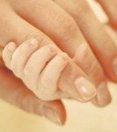|
A hypoplastic nasal bone
(absent or underdeveloped) increases the likelihood that a fetus has Down
syndrome, and the likelihood that a fetus has Down syndrome increases as the
length of the nasal bone (NB) decreases [1].
Because normal nasal bone length
during the second trimester appears to vary according to race and ethnic
background the use of a single fixed cutoff value is unsuitable for predicting
Down syndrome in all populations [2,3,4]. Cusick and colleagues proposed a normal nasal
bone length be defined as > 0.7 MoM [2]. Odibo and co-workers found a
nasal bone MoM <0.75 to be the best definition of NB hypoplasia in their
studies [5] . Has et al., found a nasal bone length less than 5th percentile
, <0.72 MoM, or BPD:NBL > 12.16 could be used in the second trimester for diagnosing fetal
NB hypoplasia as a means of predicting
trisomy 21 because their predictive values are similar at a fixed 5%
false-positive rate [6]
The calculator below will give means and percentiles fr a gieven
ethnic group. Where studies provide median multiples for entry is iven for
the gesational ages 15 to 22 week
use ALL DATA FPR SONEK etc. alle gestational age.
has stated
simple cut off of less than
decreasing the mom will decrease false positive rare has found in
their study
REFERENCES:
1. Cusick W, et. al., Fetal nasal bone length in euploid and aneuploid
fetuses between 11 and 20 weeks' gestation: a prospective study. J Ultrasound
Med. 2004 Oct;23(10):1327-33. PMID: 15448323
2.
Cusick W, et. al., Likelihood ratios for fetal trisomy 21 based on nasal bone
length in the second trimester: how best to define hypoplasia?
Ultrasound Obstet Gynecol. 2007 Sep;30(3):271-4.
PMID: 17721915 3. Cicero S,et. al., Nasal bone hypoplasia in trisomy 21
at 15-22 weeks' gestation. Ultrasound Obstet Gynecol. 2003 Jan;21(1):15-8.
PMID: 12528155
4. Papasozomenou P, et al
Fetal nasal bone length in the second trimester: comparison between population
groups from different ethnic origins.
J Perinat Med. 2014 Dec 15. pii: /j/jpme.ahead-of-print/jpm-2014-0296/jpm-2014-0296.xml.
doi: 10.1515/jpm-2014-0296. [Epub ahead of print]
PMID: 25503860
5. Odibo AO, et al., Defining nasal bone hypoplasia in second-trimester Down
syndrome screening: does the use of multiples of the median improve screening
efficacy?
Am J Obstet Gynecol. 2007 Oct;197(4):361.e1-4. PMID: 17904959
6.
Has R, et. al. Fetal nasal bone hypoplasia in the second trimester:
Comparison of diagnostic methods for predicting trisomy 21 (Down syndrome).
J Clin Ultrasound. 2015 Jul 14. doi: 10.1002/jcu.22277. [Epub ahead of
print]
PMID: 26177593
7. Chiu WH, et. al. Normative curves of fetal nasal bone length for the ethnic
Chinese population.
Ir J Med Sci. 2011 Mar;180(1):73-7. doi: 10.1007/s11845-010-0520-4. Epub 2010
Jul 9.
PMID: 20614254
8. Narayani BH, Radhakrishnan P.Mid-second Trimester Measurement of Nasal Bone
Length in the Indian Population.
J Obstet Gynaecol India. 2013 Aug;63(4):256-9. doi: 10.1007/s13224-012-0335-5.
Epub 2013 Feb 22.
PMID: 24431652
9. Sonek JD, et. al., Nasal bone length throughout gestation: normal ranges
based on 3537 fetal ultrasound measurements.
Ultrasound Obstet Gynecol. 2003 Feb;21(2):152-5.
PMID: 12601837
10. Bunduki V, et al., Fetal nasal bone length: reference range and clinical
application in ultrasound screening for trisomy 21.
Ultrasound Obstet Gynecol. 2003 Feb;21(2):156-60.
PMID: 12601838
w 50 5
16 3.8 3.11
17 4 3.5
18 4.3 3.7
19 4.8 4.1
20 5.1 4.5
21 5.5 4.62
22 6 5.24
turkish
Yanik FF, et. al. Second trimester fetal nasal bone length in a low-risk Turkish
population.
Prenat Diagn. 2011 Oct;31(10):962-6. doi: 10.1002/pd.2811. Epub 2011 Jun 28.
PMID: 21710589
w 50 5
16 3 2.4
17 3.5 2
18 3.8 2.6
19 4.8 3.1
20 5.4 4.3
21 5.7 4.5
22 6 4.8
Ultrasonographic measurement of fetal nasal bone length in the second trimester
in Korean population.
Jung E, Won HS, Lee PR, Kim A.
Prenat Diagn. 2007 Feb;27(2):154-7.
PMID: 17186563
w 50 5
15 3.34 2.59
16 3.73 2.97
17 4.11 3.36
18 4.5 3.74
19 4.88 4.13
20 5.27 4.51
21 5.65 4.9
22 6.04 5.28
Nasal bone hypoplasia in trisomy 21 at 15 to 24 weeks' gestation in A high risk
Thai population.
Naraphut B, Uerpairojkit B, Chaithongwatthana S, Tannirandorn Y,
Tanawattanacharoen S, Manotaya S, Charoenvidhya D.
J Med Assoc Thai. 2006 Jul;89(7):911-7.
PMID: 16881420
All calculations must be confirmed before use. The suggested results are not a substitute for clinical
judgment. Neither Perinatology.com nor any other party involved in the preparation or publication of this site shall be liable for any special, consequential,
or exemplary damages resulting in whole or part from any user's use of or reliance upon this material.
|

